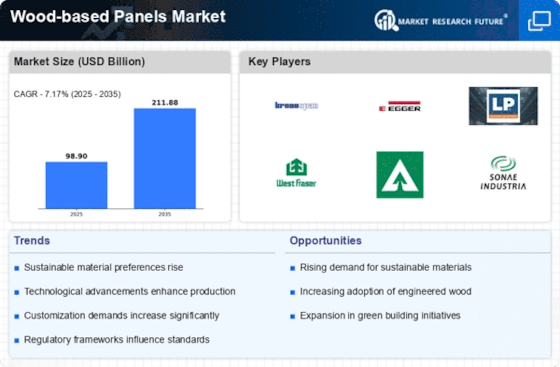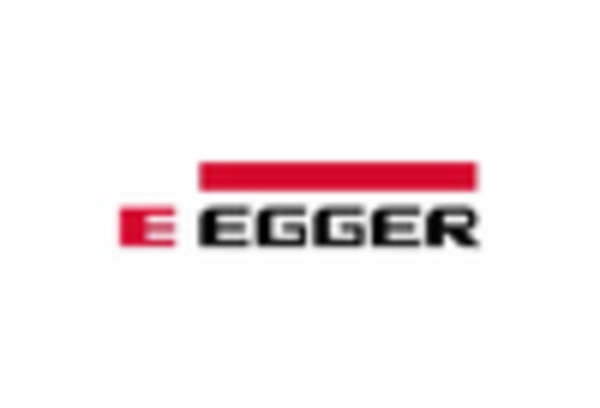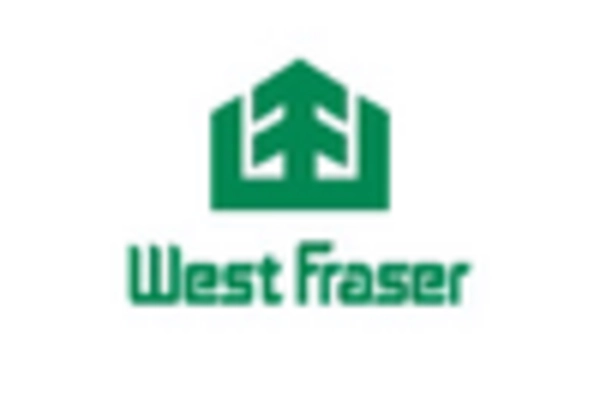-
Executive Summary
-
Scope of the Report
-
Market Definition
-
Scope of the Study
- Definition
- Research Objective
- Assumptions
- Limitations
-
Research Process
- Primary Research
- Secondary Research
-
Market size Estimation
-
Forecast Model
-
Market Landscape
-
Porter’s Five Forces Analysis
- Threat of New Entrants
- Bargaining power of buyers
- Threat of substitutes
- Segment rivalry
- Bargaining Power of Buyers
-
Value Chain/Supply Chain Analysis
-
Market Dynamics
-
Introduction
-
Market Drivers
-
Market Restraints
-
Market Opportunities
-
Global Wood Based Panel Market, By Product
-
Introduction
-
Medium density fibreboard (MDF)
- Market Estimates & Forecast, 2020-2027
- Market Estimates & Forecast by Region, 2020-2027
-
High density fiberboard (HDF)
- Market Estimates & Forecast, 2020-2027
- Market Estimates & Forecast by Region, 2020-2027
-
Oriented Strand Board (OSB)
- Market Estimates & Forecast, 2020-2027
- Market Estimates & Forecast by Region, 2020-2027
-
Particleboard
- Market Estimates & Forecast, 2020-2027
- Market Estimates & Forecast by Region, 2020-2027
-
Softword
- Market Estimates & Forecast, 2020-2027
- Market Estimates & Forecast by Region, 2020-2027
-
Plywood
- Market Estimates & Forecast, 2020-2027
- Market Estimates & Forecast by Region, 2020-2027
-
Others
- Market Estimates & Forecast, 2020-2027
- Market Estimates & Forecast by Region, 2020-2027
-
Global Wood Based Panel Market, By Application
-
Introduction
-
Construction
- Market Estimates & Forecast, 2020-2027
- Market Estimates & Forecast by Region, 2020-2027
- Floors & Roofs
- Windows & Doors
- Siding
- Others
-
Furniture
- Market Estimates & Forecast, 2020-2027
- Market Estimates & Forecast by Region, 2020-2027
- Residential
- Commercial
-
Packaging
- Market Estimates & Forecast, 2020-2027
- Market Estimates & Forecast by Region, 2020-2027
-
Global Wood Based Panel Market, By Region
-
Introduction
-
North America
- Market Estimates & Forecast, 2020-2027
- Market Estimates & Forecast by Product, 2020-2027
- Market Estimates & Forecast by Application, 2020-2027
- US
- Canada
-
Europe
- Market Estimates & Forecast, 2020-2027
- Market Estimates & Forecast by Product, 2020-2027
- Market Estimates & Forecast by Application, 2020-2027
- UK
- Germany
- France
- Italy
- Rest of Europe
-
Asia-Pacific
- Market Estimates & Forecast, 2020-2027
- Market Estimates & Forecast by Product, 2020-2027
- Market Estimates & Forecast by Application, 2020-2027
- China
- Japan
- India
- Rest of Asia-Pacific
-
Rest of the World
- Market Estimates & Forecast, 2020-2027
- Market Estimates & Forecast by Product, 2020-2027
- Market Estimates & Forecast by Application, 2020-2027
- South America
- Middle East & Africa
-
Competitive Landscape
-
Company Profile
-
ante-Group
- Company Overview
- Products/Services Offering
- Financial Overview
- Key Developments
- Strategy
- SWOT Analysis
-
Dongwha Group
- Company Overview
- Products/Services Offering
- Financial Overview
- Key Developments
- Strategy
- SWOT Analysis
-
Klenk Holz AG
- Company Overview
- Products/Services Offering
- Financial Overview
- Key Developments
- Strategy
- SWOT Analysis
-
Kronospan
- Company Overview
- Products/Services Offering
- Financial Overview
- Key Developments
- Strategy
- SWOT Analysis
-
Caihong Wood Co. Ltd
- Company Overview
- Products/Services Offering
- Financial Overview
- Key Developments
- Strategy
- SWOT Analysis
-
Weyerhaeuser Company
- Company Overview
- Products/Services Offering
- Financial Overview
- Key Developments
- Strategy
- SWOT Analysis
-
Norbord Inc.
- Company Overview
- Products/Services Offering
- Financial Overview
- Key Developments
- Strategy
- SWOT Analysis
-
Sonae Indústria, SGPS, SA
- Company Overview
- Products/Services Offering
- Financial Overview
- Key Developments
- Strategy
- SWOT Analysis
-
Kastamonu Entegre
- Company Overview
- Products/Services Offering
- Financial Overview
- Key Developments
- Strategy
- SWOT Analysis
-
Louisiana-Pacific Corporation
- Company Overview
- Products/Services Offering
- Financial Overview
- Key Developments
- Strategy
- SWOT Analysis
-
List of Tables
-
Global Wood Based Panel Market: By Region, 2020-2027
-
North America Wood Based Panel Market: By Country, 2020-2027
-
Europe Wood Based Panel Market: By Country, 2020-2027
-
Asia-Pacific Wood Based Panel Market: By Country, 2020-2027
-
RoW Wood Based Panel Market: By Country, 2020-2027
-
Global Wood Based Panel Market, By Product, By Regions, 2020-2027
-
North America Wood Based Panel Market, By Product, By Country, 2020-2027
-
Europe Wood Based Panel Market, By Product, By Country, 2020-2027
-
Asia-Pacific Wood Based Panel Market, By Product, By Country, 2020-2027
-
RoW Wood Based Panel Market, By Product, By Country, 2020-2027
-
Global Wood Based Panel Market, By Application: By Regions, 2020-2027
-
North America Wood Based Panel Market, By Application: By Country, 2020-2027
-
Europe Wood Based Panel Market by Application: By Country, 2020-2027
-
Asia-Pacific Wood Based Panel Market by Application: By Country, 2020-2027
-
RoW Wood Based Panel Market by Application: By Country, 2020-2027
-
Global Wood Based Panel Market: By Region, 2020-2027
-
Global Wood Based Panel Market: By Product, 2020-2027
-
Global Wood Based Panel Market: By Application, 2020-2027
-
North America Wood Based Panel Market, By Country
-
North America Wood Based Panel Market, By Product
-
North America Wood Based Panel Market, By Application
-
Europe: Wood Based Panel Market, By Country
-
Europe: Wood Based Panel Market, By Product
-
Europe: Wood Based Panel Market, By Application
-
Asia-Pacific: Wood Based Panel Market, By Country
-
Asia-Pacific: Wood Based Panel Market, By Product
-
Asia-Pacific: Wood Based Panel Market, By Application
-
RoW: Wood Based Panel Market, By Region
-
RoW Wood Based Panel Market, By Product
-
RoW Wood Based Panel Market, By Application
-
-
List of Figures
-
Research Process of MRFR
-
Top down & Bottom up Approach
-
Market Dynamics
-
Impact Analysis: Market Drivers
-
Impact Analysis: Market Restraints
-
Porter’s Five Forces Analysis
-
Value Chain Analysis
-
Global Wood Based Panel Market Share, By Product, 2020 (%)
-
Global Wood Based Panel Market, By Product, 2020-2027 (USD MILLION)
-
Global Wood Based Panel Market Share, By Application, 2020 (%)
-
Global Wood Based Panel Market, By Application, 2020-2027 (USD MILLION)
-
Global Wood Based Panel Market Share (%), By Region, 2020
-
Global Wood Based Panel Market, By Region, 2020-2027 (USD MILLION)
-
North America Wood Based Panel Market Share (%), 2020
-
North America Wood Based Panel Market, By Country, 2020-2027 (USD MILLION)
-
Europe Wood Based Panel Market Share (%), 2020
-
Europe Wood Based Panel Market, By Country, 2020-2027 (USD MILLION)
-
Asia-Pacific Wood Based Panel Market Share (%), 2020
-
Asia-Pacific Wood Based Panel Market, By Country, 2020-2027 (USD MILLION)
-
Rest of the World Wood Based Panel Market Share (%), 2020
-
Rest of the World Wood Based Panel Market, By Country, 2020-2027 (USD MILLION)
-
"


















Leave a Comment